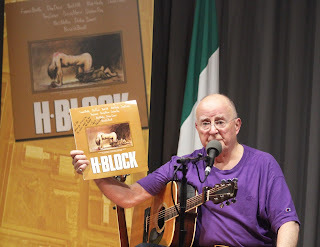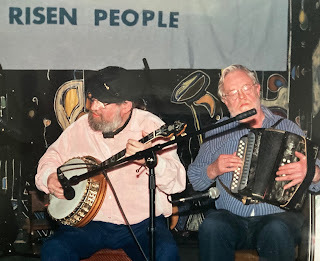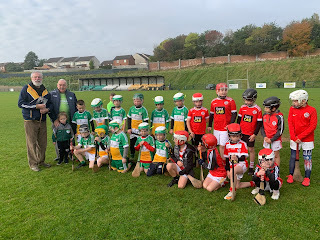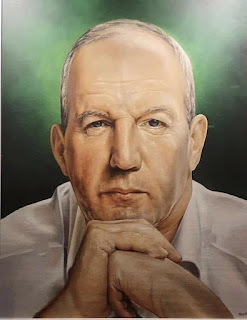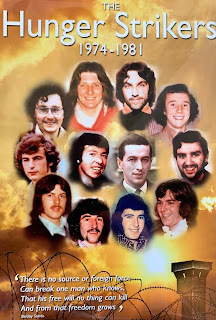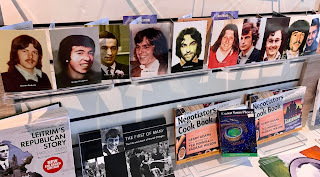Gerry Adams's Blog, page 20
November 10, 2021
Des Ferguson - Éireannach, Gael, fear chéile Mháire, athar agus Daideo, seán Daideo, Poblachtach, Laoch
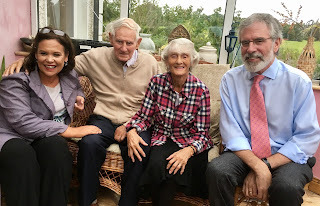 We buried Des Ferguson in Kells, County Meath last Sunday. He died aged 91 after a short illness.
We buried Des Ferguson in Kells, County Meath last Sunday. He died aged 91 after a short illness. His family, friends in the GAA, his neighbours and republicans from across Ireland gathered to give him a good send off. This is my tribute.
Ar dtus bá mhaith liom mo buiochas a thabhairt do teaghlach Des mór deis a thug siad domhsa ag a caint anseo ar sean chara and comrade Des Ferguson.
I also want to thank Des for giving us such a fine day – he was a great lover of nature and he would have enjoyed the spectacle of family and friends celebrating his life here in Ceannais.
Ba Éireannach, Gael, fear chéile Mháire, athar agus Daideo, seán Daideo, Poblachtach, Laoch Des Ferguson.
Bá mhaith liom mo comhrón – comh bhrón mo chroi a deanamh le Mháire agus a theaglach, le Des óg (Níl sé ro óg anois) Orlaith, Terry, Eimear, Conor, Pearse, Barry, Diarmuid, Rory.
Agus tá muid ag smaoineamh faoi Ronan ar a lá mór seo.
Agus ar comhrón le a dheirifeacha Rita agus Deirdre. Agus a dhearthair Liam.
Ba imeoir peile agus iomóna den scoth Des.
Le Naomh Vincent, Baile Atha Cliadh agus anseo í Mhí le Gaeile Colmcille. And his exploits and achievements, his prowess in the field of playing is celebrated throughout the Gaeldom.
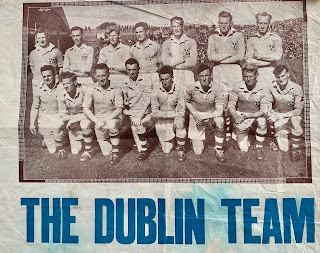 He was a proud Dub and very proud of the fact that he won two All-Ireland football medals – 1958 – 1963 – but he always lamented with a smile not having an All-Ireland hurling media, particularly after Tipp robbed Dublin in the 1961 hurling final.
He was a proud Dub and very proud of the fact that he won two All-Ireland football medals – 1958 – 1963 – but he always lamented with a smile not having an All-Ireland hurling media, particularly after Tipp robbed Dublin in the 1961 hurling final.
Anytime you talked about hurling or football and it came up about his achievements and the many accolades he had won he was always mentioned with a wee wry smile “I would have loved to have had a hurling one”.
He lived and breathed Cumann Luath Cleas Gael and gaelic games all his life.
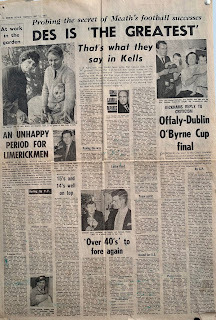 And in more recent times when we couldn’t see each other as often perhaps as we should have, when I phoned him the talk always turned to Gaelic games, always turned to what was happening.
And in more recent times when we couldn’t see each other as often perhaps as we should have, when I phoned him the talk always turned to Gaelic games, always turned to what was happening.
He followed the fortunes of the Ulster teams including Antrim and he had a special grá for his father’s county – County Down where Des was born in Castlewellan.
I first met Des and Máire in the 1970s.
Any celebration of Des’s life would be incomplete without a celebration of Máire’s life. Thankfully she is still with us although she isn’t well at this time.
She and Des were a wonderful partnership and the family they reared are a credit to them and a core part of their legacy.
Máire and Des met in 1949 at a St. Vincent’s Club event in the Carlton Hall in Marino.
Dessie was a rising star, a dual player with Vincent's. At that time Vincent's was the premier Dublin club.
Des and Máire started going out together and were married five years later on a Monday to facilitate Des’s games and playing schedule. The story of any GAA home.
They were both from Republican families.
Des’s father Liam was active in the Castlewellan unit of the IRA in the 1920s along with his Uncle Samuel.
His father played football for Castlewellan GAC and for Down.
Samuel and Liam moved to Dublin in the 1930s to avoid harassment by the old RUC.
Interestingly, and Des always told this with a quiet, contrary type of pride - Des’s grandfather signed the Ulster Covenant in 1912.
In the 1911 census the Ferguson's are Presbyterians.
Des father went on to join the IRA despite his father’s politics. Or maybe because of his fathers politics. Or maybe he just took after his mother.
Máire’s parents were both active in 1916. Her father Jack McDonnell was in Dublin’s 2nd Battalion and fought in the GPO garrison in O’Connell Street.
Her mother Georgina Wright was in Cumann na mBán.
Máire is rightfully proud of her family history.
She and Des shared a love for each other – for Gaelic games, for their family and for Ireland.
They went on to have ten children. So, it wasn’t all Gaelic games.
One of their sons Ronán died from a brain tumour when he was just 16.
By now the Ferguson clan was living in County Meath; first in Oldcastle and then in Kells.
That’s when I met them. Des was very active with An Cumann Cabhrach.
Tom Murray who was a stalwart of that organisation had a little chalet in Aughyneill and Des arranged for Colette and I to go there when I was released from Long Kesh.
Our Gearóid was 4 and that was the first time we were together as a family and the start of many, many visits.
Des and Máire were wonderful hosts. Any number of people could stand here and say that. There was always a welcome. A cup of tea. Always a bit of homemade scone. Always an interest and a curiosity about what was happening.
Once they took us to Dublin, along with Florrie French, another stalwart, to a Chieftain’s Concert.
Many people might not remember or have heard of Florrie French but she sold more An Phoblachts than anybody except Eddie Fullerton and she was a wonderful, wonderful free independent, strong woman.
My memory of her at the Chieftains concert is that she had dung on her boots because she had just come straight off the farm, jumped in the car and away we went.
Des had a great love of nature. He and I also had memorable times traipsing the hills of north Meath – he brought me to Sliabh na Cailleach – we saw a fox that day.
Occasionally to Leinster games in Croke Park. One day he noticed that I had holes in both my shoes and we were in Navan and he disappeared into a shoe shop and he came out with a new pair of brogues and I sat down on the pavement and put on the new shoes and put the old ones in the bruscar.
That was the like of him. He was a wonderful, he was loyal, he was kind and a good natured friend and comrade.
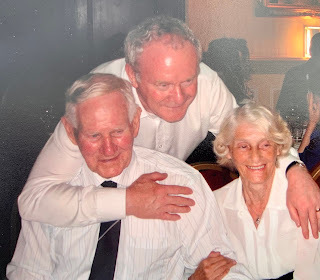 Martin McGuinness and he and Máire were very firm friends. Martin Loved Des and Máire.
Martin McGuinness and he and Máire were very firm friends. Martin Loved Des and Máire.
Des and Máire were firm supporters of the peace process. They were firm supporters of the efforts to develop Sinn Féin. Without doubt we would not be as strong as we are today without their active support and the support of others like them who bore the brunt of state repression, harassment, the Heavy Gang, intimidation and censorship and vilification.
It is very difficult to describe the prevailing mood in this state at that time and how people who put their head above the parapet – fine patriots like Des and Máire – how they were vilified.
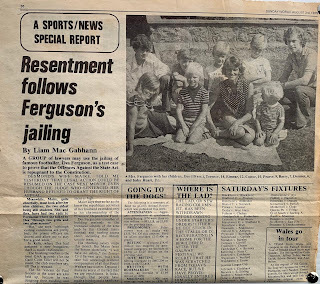 He was imprisoned once by a Kangaroo court – solely on the basis of a Garda Chief Superintendent's opinion that he was an IRA Volunteer.
He was imprisoned once by a Kangaroo court – solely on the basis of a Garda Chief Superintendent's opinion that he was an IRA Volunteer.
The Superintendent repeatedly refused to answer questions about the basis of his opinion.
Des got sentenced to a year in Portlaoise.
He told afterward that he got a relatively easy time because most of the prison officers were GAA supporters and he was a novelty to be among them.
Martin Ferris would say he also was a GAA stalwart but that’s an entirely different story. Des won another medal in Portlaoise - a leather one made by the prisoners. He, Martin Ferris and Joe B O Hagan were on the same team.
The Coiste Bainitsi – the GAAs Management Committed discussed Des’s incarceration and in July 1975 they applied for a visit to Portlaoise.
The state refused to allow them to visit Des Ferguson.
At the time of his arrest Des was a woodwork teacher. When he was released he was blocked from going back to his job and denied his right to his pension.
The GAA protested against this very vindictive measure and Des and his union fought for that for long ten years until he got his rights restored.
I remember well when he told me that was going back to teaching – he was a muinteoir go h-iontach. He was delighted to be back with his students.
In the meantime between prison and getting back the right to teach he worked in the building trade.
He really enjoyed teaching young people.
He loved nature. Máire was the gardener in the partnership but Des loved wood – I have a garden bench – a garden table and a coffee table all made by Des in his little shed at the back of the house where he also mended hurls.
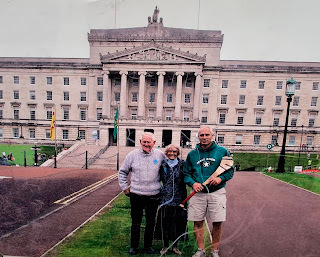 Conor brought him and Máire up to Stormont when we organised a Póc Fada in honour of Edward Carson – An Póc ar an Cnoc.
Conor brought him and Máire up to Stormont when we organised a Póc Fada in honour of Edward Carson – An Póc ar an Cnoc.
He was also in County Louth- I remember seeing him and Máire at the side of the road- when we brought back Vols. Mairead Farrell, Sean Savage and Dan McCann on their long journey home from Dublin to Belfast.
And when we brought Martin McGuiness home they were there also.
Now we have brought Des home.
His was a life well lived. Rooted in his republican values of decency, fairness and equality. He used to rail against the excesses of the Celtic Tiger. He spoke to me of young couples with huge mortages spending hours in gridlocked traffic on the way to or from Dublin while their children were in creches or with childminders. ‘ No quality of life’ he would say ‘ Little family time. Stress and more stress. Little time for fun’.
He also stood by the people of the North while the Dublin government acquiesced to London.
Des kept the faith. He was one of the indomitable Irish who are probably in every townland on this island and across the world – who know no matter what bunkum, what guff, what nonsense, what lies come out of the establishment here in Dublin or in Britain – they know that Britain has no right in our country - that the British government has no right in our country, that partition has no place in our future.
This was true in his father’s time and true in our time.
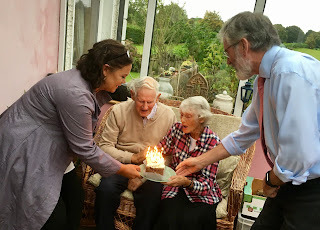 Now that we have a way to end it – we have a peaceful way to end British rule – and we can be sure that the young people gathered around this grave and those who are too young to be here - Des and Máire’s grandchildren and great grandchildren will grow old in a free united Ireland.
Now that we have a way to end it – we have a peaceful way to end British rule – and we can be sure that the young people gathered around this grave and those who are too young to be here - Des and Máire’s grandchildren and great grandchildren will grow old in a free united Ireland.
My last remarks are for the grandchildren and the great grandchildren. I don’t mind if you are not at all involved in politics, or what your views are on any of these matters, but when you get to vote in the referendum to decide our future, do so in the knowledge that your Granny and Granda helped to bring it about.
Des Ferguson served his county and his country. He made the difference.
I will finish with a few lines from a poem by Seamus Redmond – The Hurler’s Prayer.
May my stroke be steady and my aim be true
My actions manly and my misses few
No matter what way the game may go
May I rest in friendship with every foe
When the final whistle for me has blown
And I stand at last before God's judgement throne
May the great referee when he calls my name
Say, Des you hurled like a laoch; you played the game.
Go raibh maith agat Des.
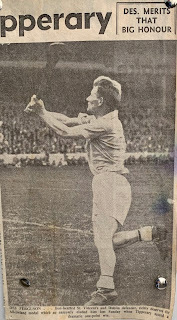
November 8, 2021
Ballymurphy remembers Criostóir de Baroid: Theresa McArdle: Time for Change – Time for Unity: Crann na Saoirse
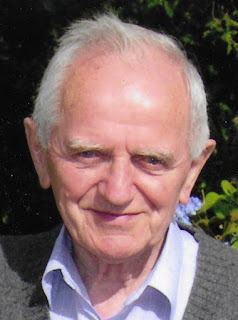
Ballymurphy remembers Criostóir de Baroid
Criostóir de Baróid died two weeks ago, surrounded by his family in Marymount Hospice in Cork where his wife Máire had died in February. About 20 people from Ballymurphy travelled to Cork by car and train to participate in Criostóir’s funeral. They were there to pay their respects to a man, who in the 1970’s along with his son Ciaran became a part of the extended Ballymurphy family.
I met Ciaran after I was released from internment in the summer of 1972. He had arrived in the area in March to take up the job of ‘warden’ for the Ballymurphy Tenants Association centre on the Whiterock Road. Pat McCarthy who had previously held the post had been killed during the Ballymurphy Massacre in 1971.
Ciaran worked closely with Frank Cahill who he describes as the “unofficial mayor of Ballymurphy, a man of enormous standing in the community.” Later in 1972 Criostóir came to visit his son. He was no stranger to Belfast. He was part of a voluntary group – the Association for Human Rights in the North – and was already at work here. In the summer of ’72 Criostóir’s group had provided financial and material support for camp for young people from Ballymurphy in Glaslough, County Monaghan.
Criostóir met Frank Cahill and many of those who were deeply involved in community work in the area. As a result the Cahill’s and the de Baróid’s worked closely together over many years. Criostóir helped establish BETWEEN. Initially his aim was to help those families deeply traumatised by the introduction of internment. Some had loved ones killed. Others had been forced to leave their homes as refugees and others had one or more family members interned.
He became so embedded in the Ballymurphy area and in his efforts to help people Criostóir took early retirement to work voluntarily. BETWEEN challenged the British State on its use of internment without trial, extra-judicial killings, the supergrass system, strip-searching in the prisons, the hunger strikes or the brutality of the British army. But its work also went beyond these issues.
Speaking at his father’s funeral Ciaran de Baróid explained the work of his father and of BETWEEN. He said: “Although best known as the scheme that provided respite for the families of republican and loyalist prisoners, and others under extreme stress, BETWEEN was much more than that. It was essentially an organisation that confronted oppression and injustice throughout the span of the Troubles.”
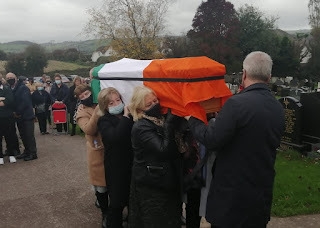 Criostóir lived campaigned tirelessly against injustice. He was a champion for those oppressed by the British state in the North.
Criostóir lived campaigned tirelessly against injustice. He was a champion for those oppressed by the British state in the North.
Ciaran Cahill put it well in a letter he wrote to Criostóir last year: “through your work people were given hope in the darkest of times. The holiday camp provided much needed respite, joy and happiness when people were at their lowest, and re-energised them for whatever lay ahead. Not to mention your tireless efforts to highlight human rights abuses and injustices far and wide, many times falling on deaf ears, but you were never deterred, and forged ahead.
I’ve lost count of the number of people who still talk about the time they spent in Cork as children and how they were treated by the good people of Cork. This will remain with them forever…”
On behalf of all of those from Ballymurphy and beyond who benefited over many decades from Criostóir’s compassion and humanity I want to extend by deepest condolences to Ciaran, Niall, Fionnuala, Emer, Cahil and Neasa and to Criostóir’s sisters Joan and Kay.
Theresa McArdle
The suddenness of Theresa McArdle’s death last week was a shock to all of us who knew and loved her. On Thursday she texted and emailed out a wee note to everyone who works in and around the Sevastopol St office where she looked after us all. Her note was a reminder that Cónall was leaving us to work elsewhere. It said:
“Hi All,
The card for Cónall is under the notebook on my desk please sign it and leave your contribution inside … Only a few have signed it so far, thank you, ye know who you are.
Go raibh maith agaibh
Theresa”
After we heard the news of her death I tweeted:
“Sweet, kind, pleasant, staunch Treasa. I went 2 the office 2day becos she texted me 2 remind me to sign Cónall’s card. She left it below her notebook. I signed my name beside her’s in wonderment and sorrow that she had died since then. Grma T. U made the difference xo”
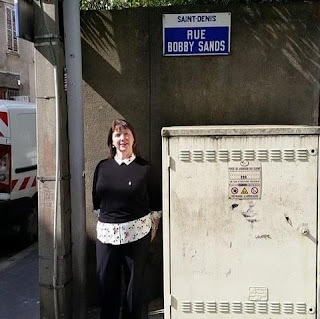
Time for Change – Time for Unity
Apart from those years when I was imprisoned I have attended every Sinn Fein Ard Fheis since 1967. That is until last Saturday.
However through the marvels of modern technology I was only missing in body not in spirit. I watched the days debates live online.
I don’t know if it was the consistently good opinion poll results over recent months that had people in good form or the fact that they were getting together under one roof for the first time in two years, but the Ard Fheis was buzzing. There were smiles everywhere. Everyone who got up to speak was applauded – some of the older hands looked seriously embarrassed by this while the younger speakers took it all in their stride.
Well done to everyone involved in the planning of the Ard Fheis. I know from long experience how much effort goes into making it all come together on the day and how many comrades are a part of the team and the success. So comhgairdheas to everyone involved.
A united Ireland and change were the two big themes of the Ard Fheis and Mary Lou didn’t mince her words. She said it loud and clear: “I want to lead as Taoiseach if you give us that chance … we can unite our country. To make this happen we need a government that shows-up for you. A government for the people and a Taoiseach that puts you and your family first - now and always. So, to those who told me – again and again – to make sure we run enough candidates at the next Dáil election. I hear you loud and clear because – friends – the time for change is now.”
Housing, Health, Climate Change and the Environment, Law and Order, the Courts were among the many positive, radical motions debated and passed. It was an all-island, all-Ireland Ard Fheis. It was international with speakers representing the Palestinian people and the people of Cuba.
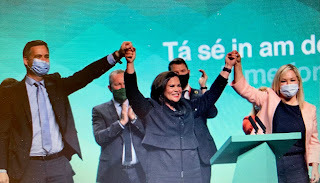 Declan Kearney, the Party Chairperson and then Mary Lou also referenced a new initiative from the party that will see ‘Peoples Assemblies’ held in key locations across the island and among the diaspora. Under the theme of “The New Ireland is for Everyone – Have your Say” the initiative will be island-wide and global. It will be an ambitious, 18 month long public and private consultation, open to everyone. It is due to begin in January 2022.
Declan Kearney, the Party Chairperson and then Mary Lou also referenced a new initiative from the party that will see ‘Peoples Assemblies’ held in key locations across the island and among the diaspora. Under the theme of “The New Ireland is for Everyone – Have your Say” the initiative will be island-wide and global. It will be an ambitious, 18 month long public and private consultation, open to everyone. It is due to begin in January 2022.
Everyone should have their say on the political and constitutional future of the island of Ireland. It makes sense. The unity referendum and the possibility of a united Ireland are a central part of the mainstream political discourse at this time. Barely a week passes with two of more significant contributions from academia, the media, and individuals writing about, talking about Irish Unity.
For those old enough to remember the ‘Peoples Assemblies’ idea has its roots in the Peace Commission established by Sinn Féin in January 1994 that helped contribute to the IRA cessation announced in August of that year. On that occasion five major conferences were held – one in each province – Derry, Galway, Cork and Dublin and a fifth meeting in Belfast. 228 submissions were received from a broad range of community activists, religious groups, Trade Unions, women’s rights activists, Irish language and cultural rights activists, campaign groups, politicians and individuals.
So, keep an eye open for the posters and leaflets, the social media messaging, the tweets and Facebook promotions letting you know when and where these meetings will occur. And if you belong to a community group, a women’s organisaiton, a youth group, a business organisation, a farming organisaiton – in fact if you have an opinion on the future of the island of Ireland – Have Your Say. Make a submission. Come to the conferences and tell us about your vision for the future.
Crann na Saoirse
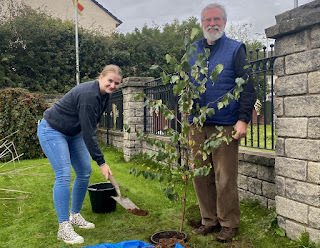
Last week I joined Aisling Reilly MLA in planting a tree in the memorial garden in Ballymurphy. Our Unity tree symbolizes our commitment to achieving a united Ireland. I look forward to watching it grow tall in a free United Ireland.
So why don’t you join us and plant your Crann na Saoirse. Plant your own Unity tree. Native broadleaf species are best.
This initiative will benefit the environment. It also provides families and communities the opportunity to plant a Unity Tree in memory of a loved one, for a new born baby, your local club, association or community group.
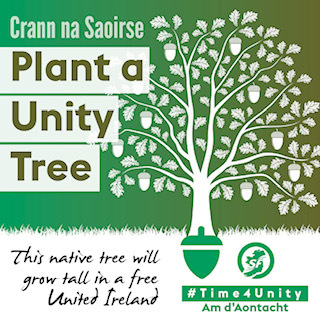
October 31, 2021
Alice Toner; The Rain that Falls on Palestine: Colin Powell; and Frederick Douglass honoured in Dublin
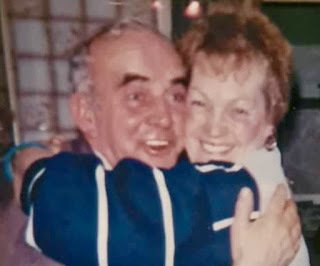
Alice Toner
I was deeply saddened by the death of Alice Toner. I knew Alice and her husband Fra all of my adult life. Like my own family they moved into Ballymurphy shortly after it was built. She and Fra were long standing republicans. Alice was born Alice Scullion in 1929 from Varna Street in the Falls area. Varna Street is now gone – a victim of redevelopment but it was situated around where Osman Street is now.
Alice was born eight years after partition was imposed. Her family suffered under the apartheid system imposed by the unionist regime at Stormont. Unemployment and poverty were widespread along with the denial of the vote in local elections and the gerrymandering of electoral boundaries. It was almost impossible to get a house if you were a Catholic.
In the late 1940s Alice met and fell in love with Francie Toner. Through the first years of their marriage they and their three children lived in one room in Alice’s family home in Varna Street. In the early 1950s they were offered a house in Ballymurphy, on the slopes of the Black Mountain. They moved into 24 Ballymurphy Drive. Unfortunately there were steps up to the front door and Alice and Fra needed a ground level home to address the needs of their daughter Theresa.
The family moved across the street to no. 27 Ballymurphy Drive and remain there to this day. The three children became 13 - Eilish, Kathleen, Carmel, Bernie, Roisin, Annemarie, Michael, Jim and Gerard, with the late Philomena, Frankie and Theresa.
The war years were tough. The British Army occupied the area. Internment saw the Ballymurphy Massacre in which 11 local people were killed. Others died during those harsh years including Alice and Fra’s son Frankie. He was shot by the UVF on 12 May 1982 while working in his brother-in-law’s fruit shop on the Antrim Road. Two other people were wounded. Frankie was married with four children.
Despite this personal trauma Alice and Fra continued to work for the Ballymurphy community and their door was always open to those in need.
Alice was an extraordinary woman – immensely strong and courageous - a mother, a grandmother, a great grandmother. She lived through tumultuous and difficult times and faced danger head on and never flinched whether it was raids on her home or on the streets of Ballymurphy.
For years Fra ran the Republican Prisoners Transport. He organised the small fleet of around six dilapidated minibuses that were used to bring families to visit loved ones in the various prisons - Crumlin Road, Long Kesh, Armagh and Portlaoise. He also raised money to keep them on the road and drove families to the prisons. The journeys to the prisons were dangerous and hazardous for drivers and families. They suffered constant harassment by the British Army, RUC and UDR. The buses and families would be stopped and searched. Sometimes they would be held for several hours. One comrade of Fra’s Thomas McGuigan remembers: “It was very hard on the children. It was freezing in winter and too hot in summer."
Fra was himself targeted by loyalists. Thomas McGuigan remembers: "It was just past the West Circular Road, outside the Orange Hall. Fra always drove past around 2pm so he was an easy target. The gunman opened fire and shot Fra several times at the wheel. He survived but one bullet was lodged too close to his spine to be removed. He was always in pain after then, never the same, and he died a few years later."
Fra died in 2002. Alice died at home on 13 October. Local republican Liam Stone described them well – “Lovely people” he said.
I want to extend my sincerest Eilish, Kathleen, Carmel, Bernie, Roisin, Annemarie, Michael, Jim, Gerard and the late Philomena, Frankie and Theresa.
Colin Powell.
I was sorry to hear of the death of Colin Powell .He was Secretary of State to President Bush from 2001 to 2005 so we met with him several times in those years. He was always courteous and had a quiet sense of humour. He told us once that he got his name Colin from his family connection to Ireland but that it was not a happy connection.
He was a descendant of Sir Eyre Coote , a scion of the Coote family, who were powerful landlords in Cavan and Clare. Coote was Governor of Jamaica in the early 1800s and Powell's family were slaves in the Governor's house. Eyre Coote made one of the slave girls pregnant .She was Colin Powell's great, great, great grandmother.
I believe that Secretary Powell regretted the position he took on Iraq and his support for the invasion and a war on the basis of intelligence that was later shown to be false. This was a monumental mistake.
He later moved away from the Republican Party and publicly endorsed Barak Obama in his run for President.
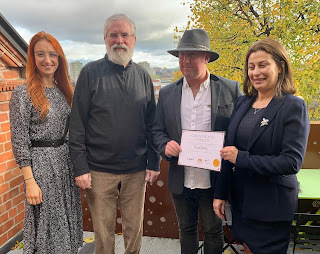 The Rain that Falls on Palestine
The Rain that Falls on Palestine
A wee while ago he told me he had written a song about Palestine and asked if I would listen to it. I thought it was excellent. It unashamedly supports the people of Palestine and is opposed to the actions of the Israeli state. It is a personal song about the experience of Palestinian families and especially of the children. Davie says: “I believe that the Palestinian people have been bullied, oppressed and abused for many years now. This song is for those proud people of Palestine.”
“On the streets of Gaza City
On a warm Monday night
Shahid sits on his father’s lap
Shaking with the fright
It’s been another night of terror
Of bombs and shells and fear
The cries of his neighbours
Thunder in his ears.’
The song was released on ITunes last week. And Davie came to Belfast to play it publicly for the first time to people here. The top room in Áras Uí Chonghaile was the venue on Friday lunchtime. Pat Sheehan said a few words about his experience of travelling to the occupied territories and to the Gaza Strip and his shock at the conditions under which the Palestinian people are forced to live. He recalled a visit to Jerusalem and witnessing the expulsion of a Palestinian family from their home of over 40 years by Israeli settlers.
Pat said: “I was also in Gaza after one of the bombardments and we stood on the rubble of the home of another Palestinian family. Three generations, 13 people wiped out in an Israeli airstrike on their home.
I know that when the conflict was at its height here that international solidarity was very important. I hope that when the Palestinian people hear this song they will understand that there is huge solidarity for them here. We also hope that the song will raise awareness of the plight of the Palestinian people and prick the conscience of the international community that hasn’t done enough to defend the rights of the Palestinian people.”
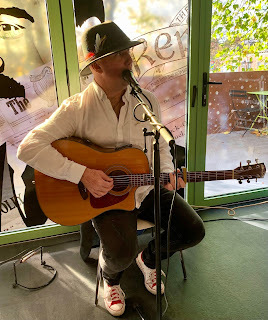 The Palestinian Ambassador Dr. Jilan Abdalmajid thanked all of those who had come in solidarity to the event and she especially thanked Davie presenting him with a Certificate of Appreciation “in grateful appreciation” of his “solidarity with the people of Palestine.”
The Palestinian Ambassador Dr. Jilan Abdalmajid thanked all of those who had come in solidarity to the event and she especially thanked Davie presenting him with a Certificate of Appreciation “in grateful appreciation” of his “solidarity with the people of Palestine.”
“Oh the rain it falls in Palestine
Is the kind that kills and maims
The kind that tears down buildings
Yet Israel shows no shame
Shahid and his father take shelter from the rain
But there is no shelter to be found
From the suffering and the pain.”
The song was warmly welcomed by the audience and Davie was embraced and thanked for taking this initiative.
The following day he was in the family home of the Pearse Family, on Pearse St in Dublin to launch the song there.
If you would like to hear “The rain that falls on Palestine” visit Davie’s website https://www.daviefurey.com/
Or download from ITunes. All money raised will go to Palestinian charities in Gaza and the occupied territories.
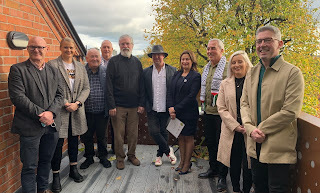
Frederick Douglass honoured in Dublin
Last Thursday the Ardmhéara Bhaile Átha Cliath Alison Gilliland unveiled a Dublin City Council plaque in memory of the visit to that city in 1845 of the African-American anti-slavery leader Frederick Douglass. The plaque is on the Irish Film Institute (IFI) building in Eustace Street, Temple Bar which was formerly the meeting house of the Society of Friends. It was also formerly the Eagle Tavern where the Dublin United Irish Society met in the 1790s. The proposal for a plaque was the idea of Sinn Fein Councillor Mícheál Mac Donncha, who is chair of the Dublin City Council Commemorations & Naming Committee.
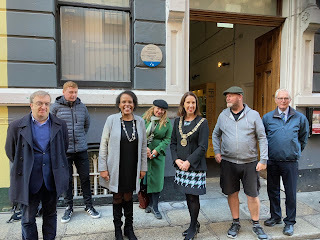 Micheál said: “This plaque to Frederick Douglass sees the great African-American anti-slavery leader recognised by our City for his immense contribution to human liberty and progress. It is appropriate that this site links the United Irish Society which met here in the 1790s, the Society of Friends which hosted Frederick Douglass and still meets on this street, and the Irish Film Institute, a cultural hub of Dublin. Acts of commemoration such as this serve to remind us that while slavery was abolished in the United States, racism persists and needs to be opposed vigorously in all countries including our own.”
Micheál said: “This plaque to Frederick Douglass sees the great African-American anti-slavery leader recognised by our City for his immense contribution to human liberty and progress. It is appropriate that this site links the United Irish Society which met here in the 1790s, the Society of Friends which hosted Frederick Douglass and still meets on this street, and the Irish Film Institute, a cultural hub of Dublin. Acts of commemoration such as this serve to remind us that while slavery was abolished in the United States, racism persists and needs to be opposed vigorously in all countries including our own.”
Among those who spoke at the event was historian and author Cecelia Hartsell who spoke of Douglass’s life and his visit to Ireland. Professor Margaret Kelleher, speaking for the IFI said: “On 9th September 1845, in this building which is now home to the IFI, Frederick Douglass delivered a stirring oration against slavery and in defence of human liberty. We at the IFI are very proud to mark today not only such a historic event but also his continuing legacy and inspiration.”
Well done Micheál and all of those involved in telling the remarkable story of this courageous and extraordinary human being.
October 29, 2021
H Bl ock LP –Resistance Music: Working together to help people: Samhain: Buiochas.
H Block LP –Resistance Music
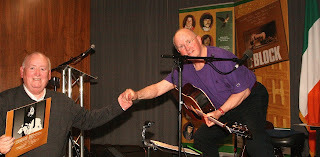
The first time Christy Moore sang ‘Ninety Miles from Dublin’ in west Belfast - his song about the obscenity of the H-Blocks - was in the old Ballymurphy Tenants Association building on the Whiterock Road in the summer of 1980. Tom Cahill had asked Christy to come to the city and play a set. Still not sure of the words, Christy had a piece of paper on which the words were written taped to the microphone.
The H Block LP which had been recorded over the previous two years was also released that summer a few months before the first hunger strike commenced and at the height of the public campaign in support of political status. It has ten tracks and the wealth of talent on display is formidable. Christy Moore, Francie Brolly, Dan Dowd, Mick Hanly, Noel Hill, Tone Linnane, Donal Lunny, Matt Molloy, and Declan Sinnott. Actor Stephen Rea reads three poems, two of them written by prisoners in the H Blocks and smuggled out from the prison.
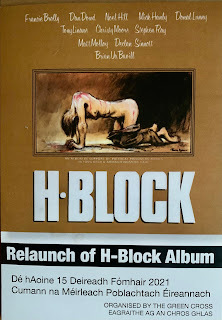 Through words and music, the plight of the prisoners in the H-Blocks and in Armagh prison, and the strength of their endurance and resistance is evoked. The LP includes ‘On the Blanket’ by Mick Hanly; Francie Brolly’s iconic ‘H-Block Song’; and ’90 Miles from Dublin’ by Christy Moore.
Through words and music, the plight of the prisoners in the H-Blocks and in Armagh prison, and the strength of their endurance and resistance is evoked. The LP includes ‘On the Blanket’ by Mick Hanly; Francie Brolly’s iconic ‘H-Block Song’; and ’90 Miles from Dublin’ by Christy Moore.
I tell you all of this because the H-Block album has been remastered as a not-for-profit production by the Green Cross, and as part of the 40th commemoration of the hunger strikes of 1980 and 81. It is a tribute to the courage and resilience of 12 men who died on hunger strike.
The re-launched album received its first public presentation at an event last Friday evening in the Felons Club on the Falls Road. Speaking about the role, impact and importance of music and art, of film and the written word former blanketman and hunger striker, Laurence McKeown, told those present that the arts have the ability to move people to tears, to lift confidence and provide hope, and to make the hairs on the back of your neck stand up. Friday night was such a night.
Christy Moore, in fine form, sat alone on the stage reminiscing and singing. The audience was enthralled. It was an intimate event, more like a family gathering than a gig. Christy was obviously enjoying the appreciative audience response to his songs and stories. Many had tears in their eyes as Christy interspersed ‘No Time for Love’; ‘Only our rivers run free’; ‘Back Home in Derry’; ‘McIlhatton,’ and other songs with stories from those years.
He spoke fondly of Bobby Sands and described ‘McIlhatton’ as one of the finest pieces of poetry he has ever read. He wondered what other marvellous pieces of prose and song Bobby might have written had he not died on hunger strike. Christy also recalled his good friends Tom Cahill and Bob Murray and their drive to use music to highlight the injustice of the H-Blocks and Armagh.
‘Ninety Miles from Dublin’ which he plans to rewrite as a tribute to Kieran Nugent, had its roots in conversations with former blanketmen Kieran, Fra McCann and Ned Brown about their experiences in the H-Blocks. Christy recalled that when the LP was launched in Dublin the venue was raided by the Garda Special Branch who confiscated all of the LPs that were there. Ten years later at a concert a man – who identified himself as one of the Branch men on the raid – presented Christy with two of the original LPs. Christy then surprised Fra McCann, who was in the audience, by calling him up and presenting him with one of his two copies.
Christy also recollected a visit to the H-Blocks in 1986 in a clapped out minibus - one of a small fleet used to bring the relatives of prisoners to the jails each day. Afterward he made another album – ‘The Spirit of Freedom’ – with the image of the Lark – Bobby Sands symbol – on the front cover. He presented Bob and Maureen Murray with a copy of this.
It was a poignant, hugely enjoyable, uplifting evening of song and craic. Thank you Christy for a memorable evening.
A small limited edition in vinyl of H-Block LP has been produced, as well as the CD. The LP and CD are available through An Fhuiseog, 55 Falls Road. www.thelarkstore.ie
The CD is available through Republican Merchandising Ltd as: The Sinn Féin Bookshop 0035318726100: www.sinnfein bookshop.com
Working together to help peopleIn the 2011 census figures and then in the statistics drawn from the 2017 Multiple Deprivation Measure (MDM) areas of Belfast are identified as either Protestant or Catholic depending on the relative size of the respective population in each. As much as this column dislikes identifying people by religious labels thats the way it is done in these projects. There are 174 so-called Super Output Areas (SOAs) in the city each with a population on average of just under 2,000 people.
Did you know that according to these figures that overall Belfast was 47% Protestant in 2011? Or that in 2017 the highest income poverty rate in Belfast was in Woodvale 1 (24.7%) which in 2011 was 91% Protestant? Or that the area with the second highest area of income poverty in Belfast was Ardoyne 2 (24.6%) which in 2011 was 95% Catholic?
Or that in the poorest 30% of Belfast 17 out of 52 SOAs are ‘Protestant areas’. And that Protestants form 44% of this population. Overall within the city Catholics continue to experience greater levels of poverty however it is also true that many loyalist working class areas endure similar levels of deprivation in relation to health and disability, crime and their living environment.
None of the larger unionist parties have shown the remotest interest in seriously challenging these problems. Everything is subordinated to maintaining a status quo that will condemn the next generation of young people to the same levels of poverty their parents have known.
Several weeks ago, before the EU produced its recent proposals on the Protocol, the DUP, UUP and TUV participated in a discussion at the Tory Party conference. It was intended to expose the damage being caused to the north’s economy by the Protocol. Instead it succeeded in confirming that the Protocol is proving advantageous to business in the North and across the island of Ireland.
Last week new figures from the Irish government’s Central Statistics Office revealed that cross-border trade on the island of Ireland continues to sharply increase. In the first eight months of this year exports from the South to the North grew by 47% compared to the same period in 2020 – from €1.516 billion to €2.223 billion.
Trade going North to South grew even greater by 61% - from €1.553 billion to €2.5 billion.
For the British Brexit Minister this was his biggest concern. He told the Tory meeting: “we are definitely seeing supply chains being reordered quite quickly. Trade between Northern Ireland and Ireland has gone up a lot in both directions.” His worry is that this “will weaken the links with GB. I think that’s inevitable.”
Once again the conservative unionist parties in the North choose to put their political self-interest above that of the working class loyalist families who will carry much of the burden of a Brexit decision that will impose increasing hardship.
Republicans believe that the best future for the people of the island of Ireland is through reunification. Working together as neighbours republicans believe that we have the wit and the wisdom to shape a new Ireland that meets the concerns of all, including our unionist brothers and sisters.
Unionist or Loyalist representatives working constructively with Republican representatives inside or outside of the Assembly and local Councils will not make them any less committed to their connection to the Union with Britain, no more than it would diminish the commitment of Sinn Fein representatives to a united Ireland. But it would mean better outcomes for those communities that constantly top the lists of those with severe poverty and deprivation.
Samhain
October is the month of Samhain. This ancient Celtic festival is one of the four quarter days, Imbolic, Bealtaine, Lughnasa and Samhain, in the old Gaelic calendar. It is celebrated on 31 October-1 November. Samhain is noted in the earliest Irish literature. It marks the end of the harvest season and the beginning if the ‘darker part’ of the tear. Winter. It is also believed to be the time when the boundary between this world and the other world relaxes so that the spirits can come into this world. The souls of the dead are said to return to their homeplaces. This led to many tricks and game which continue to this day. People dressing up, mumming, alongside more serious rituals.
Samhain is the precursor of Halloween. The exiled Irish brought it to North America where hallowed out Pumpkin lanterns replaced the Turnip lanterns of Ireland.
So as you celebrate Halloween or Oiche Shamna remember that before the English conquest of Ireland we had an advanced civilisation with its own customs, beliefs, music, culture and language, some of which endures to this day against all the odds. It is also a timely reminder that nothing stays the same. Change happens and this Samhain brings us all another year closer to ending the conquest.
Oiche Shamna faoi mhaise daoibhse.
Buiochas.
Our thanks to Brendan Kennelly and Máire Mac an tSaoi , two of our finest poets who died last weekend, for their work and for the wonderful legacy they left us all, in the Irish and English language. Their words will endure forever. Here is Brendan:
'Though we live in a world that dreams of ending,
that always seems about to give in,
something that will not acknowledge conclusion
insists that we forever begin’.
The Future of Moore St: Tony McMahon: Michael Davitt GAC
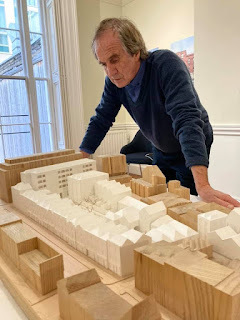
The Future of Moore Street
Last Thursday the relatives of the Signatories of the 1916 Proclamation of the Republic and the Moore Street Preservation Trust launched their detailed plan for the protection of the 1916 Moore Street Battlefield site and for its development as a historic cultural quarter. They were joined at the launched by many of those, including … and Mary Lou McDonald TD and others who have campaigned against the developer led proposal for the area that has been produced by British company Hammerson.
Hammerson’s plan which would see much of the iconic 1916 architecture of the area demolished, has the support of An Taoiseach Micheál Martin and his government. Mr. Martin, who met Hammerson and endorsed its plan before the developer published its proposal, has refused, thus far, to meet the relatives.
To their shame successive Irish governments have supported the private development of Moore Street and allowed the national monument at 14-17 Moore Street, the lasting meeting place of the 1916 leaders, to fall into decay.
The Moore Street Preservation Trust, the 1916 Relatives and other Moore Street activists have fought a long, difficult public and legal campaign to protect and preserve this site which the National Museum of Ireland has described as: “The most important site in modern Irish history.” And on Thursday the latest phase of that battle was launched with the unveiling of the scale model of Moore Street and its environs. Appropriately the Moore Street plan was unveiled in Ionad an Phiarsaigh, the Pearse Centre,former home of the Pearse family in Dublin.
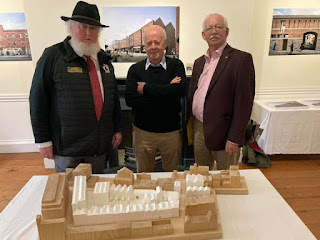 James Connolly Heron, the great grandson of James Connolly, described Thursday as a: “A red letter day for the campaign … Today the 1916 Relatives salute architects Seán Ó Muirí and James Kelly and the Trust team for the realisation of a plan that we can enthusiastically endorse and adopt as the way forward for the development of an area so close to our hearts.”
James Connolly Heron, the great grandson of James Connolly, described Thursday as a: “A red letter day for the campaign … Today the 1916 Relatives salute architects Seán Ó Muirí and James Kelly and the Trust team for the realisation of a plan that we can enthusiastically endorse and adopt as the way forward for the development of an area so close to our hearts.”
Among those in attendance were Proinsias Ó Rathaille, grandson of Michael Joseph O’Rahilly - The O’Rahilly - Harry Coyle grandson of Henry Coyle and Brendan Mulvihill, grandson of Michael Mulvihill. Their grandfathers were killed in the Battle of Moore Street.
James Connolly Heron and Proinsias Ó Rathaille unveiled the model and an audio-visual presentation was made by Seán Ó Muirí. The Moore Street Preservation Trust has photographs and details of the event which was Covid compliant. They can be accessed at:
Face book page @MooreStreetTrust and https://www.facebook.com/MooreStreetTrust/photos/
Among others who took part or came along to look at the model were Uachtarán Shinn Féin Mary Lou McDonald and Aengus O’Snodaigh TD, Mark Ward TD, Seanadóir Niall O’Donnghaile . Dublin Cllr Micheál MacDonncha, who is secretary of the Trust also spoke at the event.
The model and the detailed renderings and graphic designs will now be available for the Minister of Housing Darragh O’Brien and An Taoiseach Micheál Martin, as well as the planners, to view and examine.
The future of Moore Street is not just vitally important in the context of the 1916 Easter Rising but it is also inextricable linked to the planning laws and regulations that are supposed to protect important historic buildings and sites of national importance. Last year a hotel developer succeeded in demolishing the home of the O’Rahilly at Herbert Park in the city. The building had strong historic links to that period of Ireland’s cultural and historic renaissance and to the revolutionary period at the end of the 19th and beginning of the 20th century. In recent days it has also emerged that part of Merchants Arch, the covered laneway into Temple Bar from the Ha’penny Bridge is to be demolished, including part of The Cobblestone an iconic traditional music venue, to make way for a hotel and restaurant.
13,000 people have already signed a petition against the development including Imelda May, who has also supported the Moore Street campaign.
The great Tony McMahon has died. A musician and broadcaster Tony was one of the giants of traditional music. His music on the button accordion was passionate, deeply Irish, poignant, uplifting and spiritual. His programmes, The Pure Drop, The Long Note, Come West Along the Road and The Green Linnet with the late Barney McKenna are classics. So too his duets with Noel Hill. Irish music has lost a giant figure. Tony was a supporter of Féile an Phobail in hard times. His playing of Port na nPúcaí at a seisiún in Conway Mill remains with me to this day. He also contacted me after the Gibraltar killings with an offer to organise a concert in tribute to those who were assassinated that day. Two concerts were held. Tony also supported the Armagh Women and the H-Block men. Tony also contributed a bi-lingual piece to Hunger Strike – Reflections; a book of essays about the H-Block hunger strikes. He was a proud patriotic Clare man. Mo laoch thú Tony.
Michael Davitt GAC.
In October 2006 and again in August 2021 I was asked to give a talk on Michael Davitt to the members of Davitts GAC on the Falls Road as part of the Davitts Culture, Sport and History Weekend. I enjoyed the craic. My thanks to Chairperson Tommy Shaw, Terry Park and others for a good evening.
Michael Davitt was an amazing activist. An idealist, a Fenian, a labour activist and a founder of the Land League. He was also a founder patron of the GAA. Soccer heads will be pleased to know that he also laid a sod of Donegal turf in 1892, on behalf of Glasgow Celtic on their new ground at Parkhead. These and other stories are contained in Michael Davitt- Unselfish Idealist, available from Davitts GAC or An Fhuiseog. www.thelarkstore.ie
Michael Davitt - ‘unselfish idealist’.
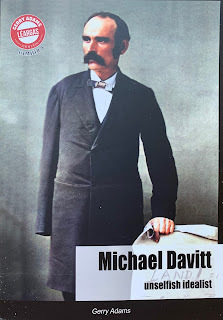
Gerry Adams launched his latest book in his Léargas series on Michael Davitt at the Davitt’s GAC grounds at Beechmount in west Belfast on Saturday morning 16 October. The training grounds were full of young people, some as young as 5 and 6 practicing their hurling moves. Davitt’s were playing St. Paul’s and the skill and determination of the youngsters as they blocked and tackled and sent the sliothar from one end of the pitch to the other was a joy to behold.Tommy Shaw and Terry Park from the Davitts were on hand to help launch the book which is drawn from two lecture on Michael Davitt that Adams gave in the Club in October 2006 and again in August 2021.
Speaking at the launch Gerry Adams said: “Much has been written of Davitt.
But what is indisputable is that he was an idealist, a nationalist, a fenian, a republican,
a revolutionary, a labour activist, a writer and journalist, a historian and an internationalist.
James Connolly who lived on the Falls Road and organised the Belfast mill and dock workers described him as ‘honest’ and an ‘unselfish idealist’. In his 60 years of life Michael Davitt helped formulate and promote new and effective methods of struggle, and changed for the better the lives of countless millions of Irish people.”The Davitt family were evicted from their home in County Mayo and travelled to England where at the age of 9 Michael worked a 60 hour week in a cotton mill. Aged 11 he lost his right arm when it was mangled in a machine.He joined the Irish Republican Brotherhood and spent seven and a half years in prison under the most horrendous conditions. After his release he returned to Ireland where he helped establish the land league, became an MP and campaigned relentlessly on behalf of the disadvantaged. Gerry Adams added: “At the heart of Davitt’s activism was a belief in the Irish people, a belief in our right to be free, and a determination that we could construct a better future, a more equitable future than that which existed then. These ideals are as much a part of our future now as they were when Davitt campaigned for land rights.”
If you want to read more about Michael Davitt this Léargas and the others in the series are
available from Republican Merchandising Ltd, Trading as the Sinn Féin Bookshop
www.sinnfeinbookshop.com and An Fhuiseog 55 Falls Road www.thelarkstore.ie
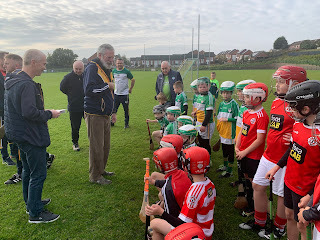
With the Davitts at their grounds in Beechmount
October 12, 2021
Jeffrey at the Crossroads: Article 16 - A game of chicken: Seán Ó Riada was a genius: So, now it’s reduced to a game of chicken.
Jeffrey at the Crossroads
Is the Union the only reason why some working class unionist voters persist in voting for parties like the DUP when that party clearly doesn’t represent them on social and economic issues? In fact the DUP often acts against the class interests of working class Protestants, Unionists and Loyalists especially those from deprived communities, suffering from the effects of Tory policies. The failure, thus far, of parties like the PUP and other smaller parties to organize and to win more significant electoral support compounds this anomaly. So does Sectarianism.
I don’t buy into the current popular notion, based on recent opinion polls that the DUP vote is in terminal decline. Unionism has lost its electoral majority but that could be turned around if its leaders got their act together. The scandals involving some of the DUP’s Assembly Ministers had a negative influence in the last election but the DUP still emerged as the largest party.
Its difficulties have increased since then. Its handling of the Brexit project was shambolic. The way its Assembly team treated Arlene Foster was cowardly but then let’s not forget that Ian Paisley also was dumped, both by the Free Presbyterian church and the party that he founded. Edwin Potts tenure was notable only for its brevity. Jeffrey Donaldson is now leader with a First Minister who he cannot change and whose office he cannot occupy at this time, despite his desire and stated intention to do so.
Of course the DUP could get over all these problems and its electorate may forgive them when it comes to the Assembly election. But for the first time in a long time the UUP, with its new leader Doug Beattie, is now standing on a platform which is different from the DUP particularly on its approach to the Assembly and the Irish protocol. The UUP have a lot of catching up to do but its leader certainly has articulated more positive attitudes to social rights issues than the DUP. How that will play out remains to be seen.
Certainly a gay unionist voter denied his or her right to marriage equality may have an electoral choice beyond Jim Wells’ dangerous silliness.
But the UUP will also not represent the economic or social interests of deprived Protestant Unionist or Loyalist working class communities even if it improves its mandate.
The fact is Sinn Féin policies are more advantageous to these communities than those of any of the unionist parties but the majority of these folks would not countenance voting republican in any significant numbers at this time. It’s all about the Union and perceptions about Sinn Féin. Those perceptions won’t change in the short term.
And the Union? The DUP say it is being undermined by the Protocol. Everyone knows the Protocol is a result of Brexit and everyone also knows that Brexit is a child of the DUP. But will that affect their vote?
Jeffrey leads a party at the crossroads. So what of Jeffrey? I won’t spend too much space here recounting his career highs and lows or take us through the twists and turns of his contorted narrative on all these matters. Or on his threat to pull his Ministers out of the Executive. Or the DUP‘s absence from cross border meetings, almost certainly in breach of the ministerial code. Jeffrey knows the game is up for old unionism. But he also knows its not over. So he is playing for time. He recently did an interview with Freya McClements of the Irish Times. In it he gave some interesting insights into his view of the country he lives in. That’s the same place we live in.
In response to a question of whether he would move if there was a United Ireland he said no. He made it clear he was against a United Ireland and gave his view that it was unlikely to happen but ...
“My roots are here, this is our home and I love this place. I love the beauty of this place. I love the people of this place … My roots are here. They’re strong. This island is my home and therefore when someone asks me are you Irish, I live on this island so geographically I’m Irish but I’m part of a wider group of nations that is British, and therefore I don’t see it as mutually exclusive, to be Irish and British or Northern Irish and British.”
He also says and I agree with him that unionists and nationalists do not understand each other. So Jeffrey let us start to correct that. I am sure that the Belfast Media Group would be delighted to do an interview with you as a means of you addressing nationalists and republicans directly. If this can be arranged I for one would look forward to reading what you will say.
A game of chicken
Will they, won’t they, trigger Article 16? For those of you who don’t know what Article 16 is? It is a part of the Protocol agreed between the EU and the British government that in the event of “serious economic, societal or environmental difficulties that are liable to persist, or to diversion of trade” would allow either side to effectively tear up parts of the deal. The Tory Minister with responsibility for negotiations with the EU, Lord Frost told the Tory party conference on Monday that the Brits believe that the threshold for triggering Article 16 has already been met. Speculation is intense that an announcement to take that decision may be announced at the Tory Party conference this week.
The excuse is the sham claim that the Protocol is having an adverse impact on the North. Apart from the Unionist parties accusing it of eroding the North’s constitutional position within the Union all of the available evidence points to the contrary. Public disquiet, even among unionists, has been negligible with protests attracting only small numbers of citizens.
In the last week our television news has been filled with images of long lines of vehicles queuing at filling stations as owners desperately try to buy fuel. Some of the images have been surreal and very dangerous. One woman is seen using plastic bags to draw petrol! Others engage in road rage and kicking cars, shouting at each other and in one instance pulling a knife. The British Army is now deployed – never a good sign.
There aren’t enough lorry drivers. Brexit forced many immigrant workers to leave. The British government has now invited them back for three months but they must leave for Christmas! They are probably expected to live in their trucks during that time. Supermarkets are having difficulty filling shelves; there is a warning that over 100,000 pigs might have to be culled and their bodies dumped because there are not enough butchers. A news report on Monday said that Johnson’s government is “considering plans to ease visa restrictions for up to 1,000 foreign butchers.” The cost of construction has increased dramatically and the supply of some medicines is giving cause for concern.
The reason for all of this chaos? Brexit. There may be some other factors at play – including the incompetence of Boris Johnson and his Cabinet - but the dominant issue creating this mess is Brexit. Boris and his friends refuse to admit this. Why would they? After all they, and the DUP, are responsible for Brexit. So, they need to shift the blame. It’s all the fault of the Protocol and those nasty people in the EU and in Ireland who back the Protocol.
The fact that Johnson and his cronies negotiated the detail of the Withdrawal Treaty, including the Protocol is simply ignored.
So, now it’s reduced to a game of chicken. The Brits are warning that they will take unilateral action to trigger Article 16. Will they – won’t they?
The EU says that it will legally challenge any move by the British to break an international agreement. Will they - wont they? Watch this space.
Seán Ó Riada
Seán Ó Riada was a genius. This column is certain of that. He brought Irish traditional music out off the back kitchens, travellers’ trailers and pub snugs and brought it centre stage and into the concert halls and theatres of Ireland and the world. Sean died on October 3, 1971, in hospital in London, England aged 40. So the 50th anniversary of his death is this year.
He was born John Reidy on August 1, 1931, in Cork City and adopted the Irish form of his name, Seán Ó Riada, after becoming interested in traditional Irish culture in the 1950s.
He studied music in University College Cork and did further studies in classical music in Paris
He and Ruth Coughlan married and they and their children moved to Cúil Aodh,Ballyvourney in the Cork Gaeltacht in 1963.
Seán initiated projects to perform Irish music in ensemble form. Until then traditional musicians played music on their own or in small groups including Ceili bands. Seán worked in Radio Éireann, as assistant director of music, from 1952-54 and in the Abbey Theatre, Dublin, as musical director, from 1955-62.
He formed the group Ceoltóirí Chualann to perform Irish traditional repertory for plays during this time.
The Chieftains emerged in this period and from that initiative.
Most famously Sean wrote the fabulous music score for the films Mise Eire and Saoirse, and for The Playboy of the Western World. His Ceol An Aifrinn is a joy.
Seán Ó Riada’s family have continued his musical journey. Cór Chúil Aodh led by Peadar Ó Riada took Féile An Phobail by storm back in troubled times. Seán Ó Riada’s contribution to Ireland and our music and culture is immeasurable. His legacy lives on.
Tá muid fior buioch do An O Riada.
https://www.youtube.com/watch?v=5LqWe...
www.youtube.com/watch?v=2q3JTw472jQ
October 5, 2021
Our Exiled Children In America: Big Bobby and The Butterfly has flown away: Remembering the 12
Our Exiled Children In America.
For centuries the twin goals of the emigrant Irish in North America were to build a new future for their families in An tOileán Úir (the new world – America) and to free their native land from the centuries of colonisation and occupation.Having successfully secured the independence of the American Colonies from England George Washington praised the role of the Irish in helping to achieve that goal. In the language of his day Washington said: “When our friendless standards were first unfurled, who were the strangers who first mustered around our staff? And when it reeled in the light, who more brilliantly sustained it than Erin’s generous sons?... May the God of Heaven, in His justice and mercy, grant thee more prosperous fortunes, and in His own time, cause the sun of Freedom to shed its benign radiance on the Emerald Isle.”
In more recent years Irish-America played a standout role in opposing sectarian discrimination through the MacBride principles campaign and in challenging British miscarriages of justice. Irish America stood with the hunger strikers. It was key to building the peace and has steadfastly defended the Good Friday Agreement. Evidence of this was on display in Washington during the visit last week of British Prime Minister Boris Johnson. President Biden and his administration, as well as Congressional leaders, were forthright in their support for the Irish Protocol and the Good Friday Agreement. While sitting beside Johnson at a press conference in the White House President Biden told the media that neither he, “nor I might add would many of my Republican colleagues like to see a change in the Irish accords, the end result having a closed border in Ireland.” Many other US leaders were equally resolute in their rejection of any suggestion that there could be a US – British trade deal if the Good Friday Agreement was threatened. A few days earlier the Speaker of the House Nancy Pelosi had warned the British that there could be no trade deal “if there is destruction of the Good Friday Accords.” Congressman Richard Neal, who is the chair of the House Committee on Ways and Means met Boris Johnson and said afterward: “that any agreement reached between the UK and the EU on the future of the Protocol must not undermine the integrity of the Good Friday Agreement nor threaten the institutions it created.“ Some in the British media realised quite quickly that things were not going Johnson’s way. The London Times headlined one of its reports on the meeting between the two leaders: “Keep your hands to yourself, Irish Joe Biden tells Boris Johnson.” However, it was one of Johnson’s Cabinet Ministers, George Eustice, who with typical arrogance and in a patronising tone dismissed President Biden’s comments on the grounds that the Protocol is “very complicated” and consequently: “I’m not sure he (Biden) does fully appreciate all of that.” Eustice added: “He is probably at the moment just reading the headlines, reading what the EU is saying, reading what Ireland might be saying which is that they would like the Northern Ireland Protocol to work in the way the EU envisage.” This insulting nonsense from a senior Conservative Minister ignores the real offender in the Brexit debacle. According to Michel Barnier in his just published book; My Secret Brexit Diary: A Glorious Illusion, the British government was ill-prepared for the Brexit negotiations; adopted a “nonchalant” approach to the talks. According to Barnier The British Government knew exactly what it was doing when it signed up to a border in the Irish Sea. It also understood that it could not claim there would be no controls on goods between Britain and the North. That was before it went on to claim exactly that. Brexit has been a disaster. While the Protocol protects jobs and business, food supplies and fuel deliveries in the North, in Britain there is a shortage of CO2, the pubs are running short of beer, long lines of vehicles queue for fuel, and there is a scarcity of foreign labour in agriculture and a shortage of lorry drivers. Into this chaotic farce then stepped the DUP leader Jeffrey Donaldson. He wrote to Nancy Pelosi warning her that the Protocol “is the altar upon which the Belfast Agreement is being sacrificed.” According to Donaldson it is the actions of the EU that are “endangering” the Good Friday Agreement and risk “taking Northern Ireland backwards.” Of course, he disregards his own role and that of his party in promoting Brexit and then supporting the Conservatives in power as they negotiated the withdrawal agreement. The reality is that Jeffrey’s deliberate ramping up of the rhetoric that threatens the Good Friday Agreement and its institutions has little to do with the Protocol or Brexit. His real agenda is clear from his interview in the Belfast Telegraph at the weekend. He wants a unionist pact to stop Sinn Féin. He wants the DUP to be the largest party and for him to be First Minister. “Unionism” he said, “cannot afford for the vote to be fragmented and Sinn Féin come through the middle to emerge as the largest party.” So, a Sinn Féin First Minister must be stopped – at all costs. None of this will come as a surprise to anyone with even the most cursory understanding of the North. 100 years ago the northern state was born in conflict and violence. It survived on sectarian abuse, injustice and discrimination. In every Westminster, Stormont Parliament, Assembly, and Convention election that has taken place since then the overriding issue on the agenda was, and remains, the constitutional status of the North. That has not changed. What has changed is that for the first time there is through the Good Friday Agreement a peaceful, democratic means for the people of the island of Ireland to determine our own future. The Unity Referendum is the way forward and the Irish government has a responsibility to prepare for that and not be swayed by the ‘no surrender’ politics of Jeffrey Donaldson. Incidentally, his interview in last Saturdays Irish Times was much more interesting. But more of that next week.
Last Thursday a portrait of Bobby Storey, by Tony Bell, was unveiled in the Andersonstown Social Club. It is a place that he had a long association with. The following night – within Covid regulations – family, friends and comrades again gathered in the Club to reflect on Big Bobby’s life and times, and his contribution to the struggle for freedom. This writer was joined on stage by Joe Austin, who chaired the event, and Liz Maskey and Marty Lynch. We told yarns – we told yarns that Bobby himself had told – about his experiences in and out of prison and we did it as Bob did himself, with a smile on his face and a chuckle in his voice. In my contribution I reminded the audience of one memorable occasion in which Bobby introduced a new phrase into the republican lexicon.
“Bob was arrested in 2015, one of hundreds of times he was arrested. There was a lot of publicity around it at the time and he was released subsequently. The PSNI Chief Constable, George Hamilton, had been asked about the IRA and he said that he thought republicans were committed to peaceful means of struggle and that the IRA still existed. So, when Bob got out we decided to do a press conference. Martin McGuinness was there, Mary Lou was there and I was there. And we decided to put Bob onto the press conference. He was Chair of Sinn Féin’s northern Cuige structure at the time.
So we were doing prep before the press conference. Richard McAuley said to Bob. “They’re going to ask you has the IRA gone away and what you should say is Yes. They’re left the stage. They’re no longer in existence. And no matter how many times they ask you that question you should say Yes, they’ve gone away, they’re not about, they don’t exist.”
Bob says right. Dead on.
We all sit down and right away a journalist says to Bob, ‘The Chief Constable says the IRA hasn’t gone away …”
As this is happening I’m watching Richard McAuley’s face.
So I got the press report of this and this is exactly what Bob said:
He said that he “agreed with the Chief Constable that republicans were committed to peaceful means.”
But he differed from him because the Chief Constable said that the IRA is still around. It’s gone. Bob said.
You could see Richard smile at how clearly Bobby was on message. But then Bob went on.
“The Chief Constable sees this in terms of the IRA as being the caterpillar that's still there.
"I think it's moved on, it's become a butterfly, it's flown away, it's gone, its’ disappeared.”
And no one asked another question about the IRA! They had their memorable line for the day.
40 years ago on the 3 October 1981 the hunger strike ended. It was the culmination of almost a full year of hunger strikes, first in Long Kesh in October 1980, then in Armagh Women’s Prison in November 1980 and finally in the H-Blocks of Long Kesh beginning on 1 March 1981 where 10 men died – Bobby Sands, Francis Hughes, Raymond McCreesh, Patsy O Hara, Joe McDonnell, Martin Hurson, Kevin Lynch, Kieran Doherty, Thomas McElwee, and Mickey Devine.
There had also been hunger strikes during the previous two decades. In the course of these Michael Gaughan died in June 1974 and Frank Stagg died in February 1976.
As part of the commemoration of these events, and as a celebration of the lives of the 12 who died on hunger strike An Fhuiseog has produced a series of beautifully designed cards. They are a remembrance that the 12 were very ordinary men who confronted by the brutality and vindictiveness of the British state behaved in an extraordinary way and gave their lives for the friends and comrades.
The cards are available from An Fhuiseog: www.thelarkstore.ie: 02890243371 or at 55 Falls Road.
September 19, 2021
Tír Éoghán Abú: Antrim Camógs show the Way: An Appeal by the Moore Street Preservation Trust: Escape to Freedom
Tír Éoghán Abú
Martin McGuinness had a great saying. Well he had lots of great sayings. This one has to do with hindsight. ‘Hindsight’ Martin would say ‘is a great man to have at a meeting.’ I thought of this as I was watching the All Ireland Football Final as Tyrone swept Mayo to one side to bring Sam Maguire back to the Lamh Dearg county. In the run into the game I thought there was little to choose between the teams. I might not have made Mayo favourites although like most Gaels I would not begrudge them a win given that they have been nearly there so often. But now with the benefit of hindsight it is clear to me that Tyrone should have been the favourites.
They are, after all the Ulster Champions. I am not being parochial here. Being the Provincial Champions in any of our provinces is no mean feat and a great achievement for the teams involved, but coming out of Ulster is a much tougher challenge than coming out of Connaught. So Mayo’s woes have little to do with a curse. It has all to do with meeting a team which was tried and tested in the playing fields of Ulster and well prepared to create and take every chance which came their way in Croke Park.
I have a great grá for Mayo. I have many friends there and in the USA where Mayo people are the back bone of Irish America. I have hiked, walked, camped, listened to music and made politics in Mayo for many years. And I have supported their footballers, especially when Ulster teams were uninvolved.
So too with Tyrone. It also is one of our historic, unbroken proud Irish counties. It too has kept the faith and I have many friends there also and in the USA where Tyrone exiles have played and continue to play a historic leadership role in the cause of Ireland. So I am delighted that they succeeded.
Mayo will be back. Both teams are to be commended for giving us such a supremely entertaining sporting spectacle. It is amazing. Just like the GAA. It is a spectacular national and international phenomenon. I attended my first All Ireland in 1960 when the footballers of County Down brought Sam across the border after beating Kerry. I was eleven. My Uncle Paddy brought me. With the benefit of hindsight it is obvious that that win didn’t just happen. It was organized.
So too with last Saturday’s Final. Fergal Logan, Brian Dooher and their back room teams built on Mickey Harte’s work and organised their players into a cohesive band of Gaelic brothers, athletic footballing wizards. Winners. And they have these in plenty including super subs. They may not have the national profile of other Gaelic giants, footballers, hurlers, camógs but have no doubt these young Tyrone Gaels are as worthy of national recognition as the greats of Dublin, Cork, Limerick, Kilkenny and Kerry.
Every county loves to win an All Ireland but there is a special feeling for those of us who live in the disputed counties of the North. Wrenched out of a 32 County state. Partitioned against our will from our neighbours in other counties. But the GAA has never been partitioned. Sam Maguire coming home to Tyrone or other northern counties is a vindication of that and proof, if proof is needed, that we northern Gaels are an essential and welcome part of the Gaeldom. Without us the Gaeldom would be incomplete. Diminished. False. That is the greatness also of Tyrone’s win.
Have no doubt that there are young boys and girls on playing fields across Ireland, including the playing fields of Antrim, with the potential to achieve that greatness also. They are out on pitches across Belfast city and up and across the county from Ballycastle to Glenavy. They are out every evening and weekend mornings learning their skills and developing their team work. Some are natural sports people. You can spot them. Even at the age of seven.
But the key is practice, practice, practice. The objective of mentors has to be to sustain their involvement into and through their teens and into senior level. That requires vision, resources, facilities, capacity, and joined up strategic development plans linking under age teams, schools and local clubs into the county set up. And coaches ,coaches, coaches.
Our County Board is doing well in their efforts to provide this. As are all our local clubs. But they need all of us to get behind them. So support your local club. Be part of the Gaeldom. Play your part.
We have the players. Antrim Camógs are playing Kilkenny in Croke as I pen these words. They didn’t get there by accident. They deserve to be there and win or lose they will do our county proud. Like the Tyrone Gaels. And the Mayo warriors.
Tyrone deserve to be All Ireland winners. Well done Tyrone Gaels. Thank you for bringing Sam home to Ulster and Tyrone.
Antrim Camógs show the Way.
Antrim Camogs won the Intermediate Final. They outplayed, out ran, out blocked and out pucked Kilkenny’s finest. Well done to all the players- the full panel- and the management and back room team. It was an exciting game. The Antrim women were tenacious and determined. Lovely hurling. Na mná abú. Go raibh míle maith agaibh.
BBC are spoil sports
The failure of the BBC to give proper coverage to the All Ireland Finals is a disgrace. Barely a mention on news programmes and no dedicated sports coverage that I can see. It is not good enough. Public service broadcasting needs to provide fair play for Gaels.
An Appeal by the Moore Street Preservation Trust
The Moore Street Preservation Trust is appealing for your help to protect and preserve “the most important historic site in modern Irish history.” (National Museum of Ireland).
Regular readers will know that Moore Street is where the last meeting of the leaders of the 1916 Rising took place. The 1916 Rising Heritage of the area is under threat from a proposed development by a London based developer Hammerson.
The Moore Street Preservation Trust is led by relatives of the signatories of the 1916 Proclamation of the Irish Republic. It has developed an alternative Masterplan from a team of leading architects, planners and consultants. Key elements of it have already been published and it has secured widespread praise and support. However to complete it the Moore Street Preservation Trust last week made an urgent appeal for financial support.
I have made my donation. I would urge all of those who believe that it is important that we preserve and protect the Moore Street site and its links to 1916 to join me. It’s very simple. Any size of a donation will be gratefully accepted. So if you want to #SaveMooreStreet the last meeting place of the leaders of the #1916Rising.
All you need is your debit or credit card: Donate[image error]https://pay-payzone.easypaymentsplus.com/fund.../campaign/26
Escape to Freedom
According to media reports there was great elation among Palestinians when the news broke that six political prisoners had succeeded in tunnelling their way to freedom from the high security Gilboa prison in northern Israel. The six were Zakaria Zubeidi, brothers Muhammad and Mahmoud al-Arida, Eham Kamamji, Yacoub Kadiri, and Munadil Nafayat. Photographs after the escape show a hole in the floor of their communal shower cubicle and an exit hole outside the wall of the prison in full view of an observation tower.
Palestinian people demonstrated in solidarity with the escapees and with Palestinian prisoners. Currently, there are approximately 4,750 Palestinians being held in dozens of prison facilities across Israel. These include 42 females, 200 children, and 550 administrative detainees (internees).
Al Jazeera quoted one activist Muhammad Khabeisa, who had land stolen by an Israeli the settlement at Evyatar said that his whole village backed the escaped prisoners. He said: “The prisoners in Palestinian jails are longing for freedom. They want to live their lives. They are not ordinary criminals, but patriots fighting for freedom… The Israelis have put Palestinians in prison with the occupation of their land. When the Palestinians take up arms, the world calls us terrorists and when we lay down our arms and resist peacefully, the Israelis kill us.”
Evidence of this can be found in the statistics of deaths of children in the first nine months of this year. Twelve children have been killed in the Israeli occupied West Bank and another 67 were killed in Gaza in May.
Every political prisoner dreams of escaping. Most never do. But with luck and careful planning there are occasional successes and these provide a morale boost for prisoners, their families and supporters. The fact that most escape attempts fail or that escaped prisoners are often recaptured doesn’t detract from the sense of confidence and self-esteem that the attempt can generate.
That is why the Palestinian escape was applauded by so many in Ireland.
September 13, 2021
Are you listening Jeffrey? Reclaiming the Enlightenment
Are you listening Jeffrey?
Unionism, especially its DUP component, has been talking up unionist and loyalist resistance to the Irish Protocol since before Boris Johnson dirty-joed them, broke his commitments to them, negotiated and then signed up to the Protocol.
There is some evidence of this in the loyalist street disturbances earlier this year and the sacking of Arlene Foster and of Edwin Poots. The dramatic decline in the polling fortunes of the DUP, as it flounders about trying to assert its former role as the undisputed leader of unionism, is also linked to its stance on Brexit and its transparent efforts to blame everyone else for a debacle they helped create.
Jeffrey Donaldson was in Dublin two weeks ago meeting An Taoiseach Micheál Martin. The Protocol was top of his agenda. The arrogance and rhetoric were loud - the politics insipid. He was at it again last week when he met the Tánaiste in Belfast. “The protocol, the Irish Sea border, has to go” he told Leo Varadkar.
Inevitably, his comments contained the not-so-subtle threat. If unionism doesn’t get its way then the Protocol, he said “has the capacity to so undermine the political progress here that it drags us backwards … the Irish Government needs to very quickly recognise the damage that this protocol is doing to political stability in Northern Ireland.”
The DUP leader speaks as if he represents the majority of citizens in the North. He doesn’t. The political instability he speaks of is rooted in the attitude and behaviour of the DUP he now leads. Donaldson refuses to accept the reality that he represents a minority. He seems to believe that if he says something often enough – however inaccurate or plain wrong - that people will believe it. Even Jeffrey himself doesn’t. So, the Protocol is all Dublin’s fault. The Protocol is damaging the northern economy. The business and farming sector are opposed to it. It is undermining the Good Friday Agreement. And so on. None of which is true.
Brexit is the responsibility of those who advocated for it, campaigned for it and voted for it, especially the DUP.
The fact is a majority of citizens in the North voted against Brexit. They wanted to remain within the EU. They were worried by the likely economic dislocation Brexit would bring. And they were right to be worried. Its impact on the British economy is clear for all to see. Ian King, who presents the daily business programme on Sky summarised the situation for many last week, when he said: “England has become a country where the pubs have no beer, farmers don’t have anyone to pick their fruit and even if they did there aren’t enough lorry drivers to get it to the shops.”
The medical supplier Seqirus has said it is postponing deliveries due to a Brexit-related shortage of lorry drivers. Logistics UK, which represents freight firms, and the British Retail Consortium (BRC) warned last month that the loss of 25,000 EU drivers is putting significant pressure on supply chains for retailers. The list of companies impacted is growing daily – Brewers, Coca Cola, Nando, McDonalds, BP, Iceland are just some. The Bank of England has also reported shortages of furniture, car parts and electoral goods, as well as cement and timber for the construction industry.
In stark contrast the most recent trade figures for the island of Ireland reveal that the business sector is taking advantage of the unique position of the North which is in both the EU single market and the customs territory with Britain. Last month the Central Statistics Office (CSO) in Dublin released trade figures showing what the London Guardian has described as evidence “deeper economic unity on the island of Ireland.”
The value of goods moving North to South in the first six months of 2021 dramatically increased by 77 per cent to €1.77 billion (£1.5 billion) – an increase on the same period last year when it was just under €1 billion. The value of good travelling South to North also jumped by 40 per cent to €1.57 billion. This is an increase of almost half a billion over the same period last year.
The Guardian newspaper concluded: “If it is sustained, Northern Ireland’s deepening economic ties with the republic – and weaker ones with mainland Britain – will raise questions over the region’s relationship with the rest of the UK.”
So, where now stands loyalist/unionist resistance to the Protocol? Two weeks ago Jamie Bryson and Jim Allister and an assortment of hangers-on travelled to Enniskillen to campaign against the Protocol. The reports on the numbers who attended vary. Most fall between one hundred and three hundred.
One seasoned journalist from Fermanagh, Denzil McDaniels writing about the Enniskillen protest said: “It’s clear that decisions to accommodate Brexit are taken at an international level and if there has been a betrayal of Unionism, loyalists should remember that it was their own basketcase of a British Government that let them down. That should be the real focus of their disillusion. Not the Irish Government and certainly not the people of Fermanagh who don’t want a return to the difficult times of Borders past…”
And that’s the prize we have to keep our eyes firmly fixed on. No going back. No returning to the past. A future in which we can all live in harmony and equality with each other. I believe that can be best achieved in a United Ireland. Others have a different view. Ok. Let’s talk about it. Are you listening Jeffrey?
Reclaiming the Enlightenment
The best kind of history is that which successfully brings the stories of our past to life. Recently I had the good fortune to buy three little books that do exactly that from An Fhuiseog on the Falls Road, beside Sevastopol Street. The three are Mary Ann McCracken 1770-1866 – Feminist, Revolutionary and Reformer; The United Irishmen and the Men of no Property, The Sans Culottes of Belfast; and Cave Hill and the United Irishmen.
Together they give a wonderful insight into the lives and working experience of those in the Belfast region who helped shape the United Irish Society of the late 18thcentury. They are all written by John Gray who is the former Librarian of Belfast’s Linen Hall Library. John Gray has written and lectured on “many aspects of Ulster’s Labour and radical history.” The pamphlets are written under the auspices of ‘Reclaim the Enlightenment’ which “is committed to recalling and celebrating that progressive era in Belfast’s past. We are convinced that doing so can lend inspiration in the present.”
Anyone born in Belfast or who has lived here even for a short time, is conscious of our Belfast Hills. These cradle the city and give it a spectacular backdrop. Foremost among these is Cave Hill, to the North of the city. It is a place long associated with the United Irish Society. Many of us are familiar with the account of the occasion in May 1795 when the leaders of the United Irishmen went to McArt’s Fort. Wolfe Tone recorded what happened there. “Russell, Neilson, Simms, McCracken and one or two more of us, on the summit of McArt’s Fort took a solemn obligation … never to desist until we had subverted the authority of England over our country and asserted her independence.”
Through John Gray’s three pamphlets the men and the women of 1798 become more than just names on the pages of a book. The connections between Belfast – a town of around 20,000 people – and its hinterland of Carnmoney, Templepatrick, Skegoneill, Hightown, and Roughfort rath, the first rebel assembly point in County Antrim that is only four miles from the Cave Hill – are described. So too is the plight of the tenant farmers and the growth of the first trade unions linked to the hand loom weavers, many of whom were from that locality.
In July 1792 Belfast celebrated the third anniversary of the French Revolution. There was a ‘Grand Procession’ with ‘citizens in pairs and people of the neighbourhood for several miles round, with green ribbons, and laurel leaves in their hats.’
Gray describes how one group was singled out. He writes, “namely, ‘one hundred and eighty of the most respectable inhabitants of Carnmoney and Templepatrick’. They bore a green flag, with the following mottos: -
Our Gallic brother was born July 14, 1789;
Alas we are still in embryo”
And on the reverse side:
“Superstitious galaxy.
The cause of the Irish Bastille; let us unite to destroy it.
Their banner was designed by James Hope, a weaver from Mallusk to the west of Cave Hill and later destined to become the most celebrated artisan United Irish leader …”
The central role played by Presbyterians and by women is also recorded in the pages of these pamphlets, one of which reflects at length on the life of Mary Ann McCracken. For a long time she was known mostly as the sister of Henry Joy McCracken but Gray reminds us of her contribution as “a revolutionary, yes, as a feminist before the term was invented and as a social reformer.”
He writes, Mary Ann “did not approve of separate women’s societies though for entirely liberated reasons arguing for the admission of women to the main societies, ‘as there can be no other reason for having them separate but keeping the women in the dark and certainly it is equally ungenerous and uncandid to make tools of them without confiding in them.’
Three relatively short pamphlets. Full of information and detail about a pivotal moment in our history. I am happy to recommend these for anyone interested in the people and places and events that have shaped Ireland.
Gerry Adams's Blog
- Gerry Adams's profile
- 29 followers


